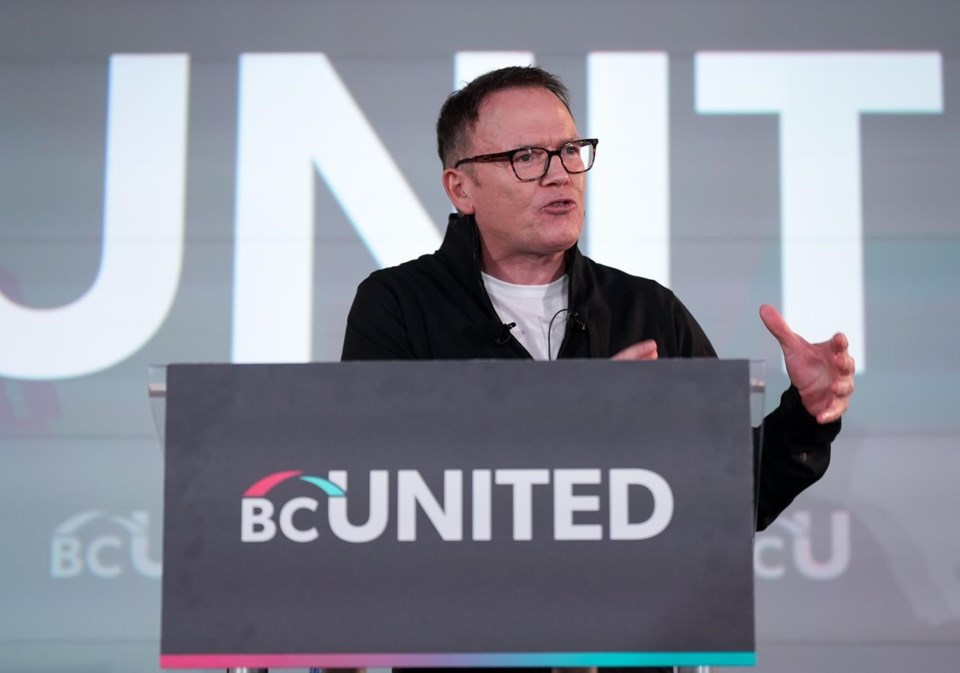VICTORIA — British Columbia's Opposition Leader Kevin Falcon pitched a housing plan Thursday to get more first-time buyers into homes just days after Premier David Eby promised to build more affordable rental units for the middle class.
BC United's "Fix Housing" plan includes four initiatives to reduce the high cost of housing and increase supply through two targeted tax cuts, public property developments and a rent-to-own program designed to help potential homebuyers raise down payments, he said.
"I've been saying since I became leader of the Opposition to this (New Democrat) government that if you want more affordable housing you have to make it less expensive," Falcon said at a news conference. "You are not going to get there when you try to have government build the housing or government be the developer."
He said he wants to help more people in B.C., where one-bedroom apartments in Vancouver rent for an average of $3,000 per month, achieve the dream of home ownership.
However, housing academic Andy Yan said the BC United housing plan and the NDP government's approach face the real and difficult issues of helping provide more affordable homes for people throughout the province.
"It's similar to the NDP that there are still underlying challenges in some of these situations," said Yan, who's the director of Simon Fraser University's City Program.
"I think the view from Victoria is a lot different from the view from Main Street. To make housing happen it's one of collaboration with multiple levels of government, especially local governments as opposed to proclamations."
The rent-to-own plan will help qualified first-time buyers who are renting a new property become homeowners through a purchase agreement where they contribute three years of rental payments towards a down payment on the same home, Falcon said.
High down payments are a stumbling block to making a home purchase for many first-time buyers in B.C., he said.
"This is a very important shift from the approach the current government takes and it will mean that lots of current renters will now have an opportunity to get into the housing market and be able to actually own their own home," said Falcon, who is a former property developer.
BC United's promise to drop the B.C. property transfer tax for first-time homebuyers who purchase a home for up to $1 million would reduce the cost of buying a home by up to $18,000, Falcon said.
First time homebuyers are usually excluded from paying the transfer tax now if the home they are buying will be their primary residence and it is priced under $500,000
B.C.'s property transfer tax for homes sold is one per cent of the first $200,000, two per cent for the value after that up to $2 million and three per cent for anything over $2 million.
"We're going to eliminate the property transfer tax for all first-time buyers up to $1 million," said Falcon. "It is crazy that we are saying to people trying to buy their first home that we're going to penalize you with up to $18,000 in taxes."
The plan also includes a promise to eliminate B.C.'s seven per cent provincial sales tax on new residential development construction costs in an effort to reduce new home costs, he said.
Falcon said the BC United housing plan will offer incentives to use empty public lands to build below-market rental housing for families and seniors.
It will offer non-profit and market homebuilders 99-year leases at a cost of $1 a year to build the rental housing, he said.
But Yan said the concept of building on empty public property can run into location and availability issues.
"Not all public land is where you want to put houses," he said. "Nobody really wants to locate near the sewage or transfer stations."
Yan said eliminating the provincial sales tax for developers of new residential projects does not guarantee savings will be passed on to buyers and dropping the property transfer tax for first-time buyers may still not be enough for renters to afford a down payment.
"Is $18,000 really the no-go period compared to, say, things like interest rates?" asked Yan. "I don't know if the property transfer tax is what's keeping a lot of first-time new buyers away from the marketplace. The cost of a home is so far outside the bounds of local incomes."
He suggested BC United and the NDP consider making changes where the property seller pays the tax and not the buyer.
Earlier this week, Eby introduced the NDP government's BC Builds program that will target and help finance affordable rental developments on property owned by governments, communities and non-profits.
The premier said at a news conference that the private market hasn't been able to ease B.C.'s ongoing housing crisis, resulting in the government making affordable housing one of its top priorities.
This report by The Canadian Press was first published Feb. 15, 2024.
Dirk Meissner, The Canadian Press



